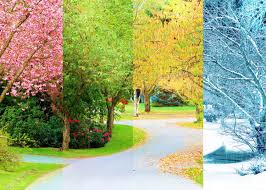太极生两仪,两仪生四象 : The Tao Of Investing
道德经中有:道生一,一生二,二生三,三生万物。还有一句话是无极生太极,太极生两仪,两仪生四象,四象生八卦
太极生两仪,两仪生四象
两仪
关于“两仪”,综合历代易学家的理论,计有七说:一说为阴阳,一说为天地,一说为奇偶,一说为刚柔,一说为玄黄,一说为乾坤,一说为春秋。但通常是指阴阳。
四象
从数学角度论四象为:四、九、八、六。
从方位角度论四象为:东、南、西、北。
从一年季节论四象为:春、夏、秋、冬。
从人的名字论四象为:孟章、执名、监兵、陵光
从飞禽走兽论四象为:青龙、玄武、白虎、朱雀。
 |
| image credit to livejapan.com |
This great blog post “ The
4 Seasons (click) “ from my friend and fellow blogger ( BULLy the BEAR ) inspired me to write something about market
cycles. In his blog post, he tries to define the market in 4 seasons base on TA
chart and interestingly highlighted that “ it can be a complicated year with
more than 4 seasons. Blame it on climate change lol! We see
winter-spring-summer-autumn then followed by a complex
winter-spring-winter-spring and finally summer season. “ 😃
In ancient Chinese thought, two polar opposites known as “Yin and Yang “
(阴阳) are deemed to set
the limits for change in the world. This traditional approach, known as the Tao
or "Way or Path", holds that a wide range of cyclical changes observed in
human existence result from the dynamic interplay between contrasting pairs of
symbolic polar elements.
Well, how can we apply this so-called “ Yin – Yang “ in
today’s market ?
Yin-Yang (阴阳) can be defined as positive or
negative market returns and the 四象 ( Four seasons ) as market
are moving in cycles.
 |
| image credit to amarginofsafety.com |
Further reading: Definition of “ Tao “ from Wikipedia
Tao or Dao (English pronunciation: /daʊ/, DOW; from Chinese: 道; pinyin:  Dào (help·info)) is a Chinese word signifying 'way', 'path',
'route', 'road', 'choose', 'key' or sometimes more loosely 'doctrine' or
'principle'.
Dào (help·info)) is a Chinese word signifying 'way', 'path',
'route', 'road', 'choose', 'key' or sometimes more loosely 'doctrine' or
'principle'.
Within the context of traditional Chinese
philosophy and religion, the Tao is the intuitive knowing of "life"
that cannot be grasped full-heartedly as just a concept but is known
nonetheless through the actual living experience of one's everyday being.
The Tao
reverses the typical [cultural] order of values: it emphasizes the weak over
the strong, the feminine over the masculine, the water that wears down the
rock, the space between things rather than the things themselves.[1]
Laozi in
the Tao Te Ching explains
that the Tao is not a 'name' for a 'thing' but the underlying natural order of
the Universe whose ultimate essence is difficult to circumscribe due to it
being non-conceptual yet evident' in one's being of aliveness.
The Tao is "eternally nameless"
(Tao Te Ching-32. Laozi) and to be
distinguished from the countless 'named' things which are considered to be its
manifestations, the reality of life before its descriptions of it.
You may read the full
description ( here ).
In Chapter 7
of this book “ The Dao of Capital: Australian Investing in a Distorted World “
, written by Mark Spitznagel , the author clearly illustrate the failure of “mainstream economics” which emphasize the “rationality “ and “
equilibrium “ of market force and also very much “ physics centric “ base on
empirical evidence and quantitative modelling has plunged the world back into
years of the repeated global financial crisis and “Great Depression”.
Investors
would do well to incorporate a little eastern philosophy and adopt a ‘Tao of
Investing’ by understanding that market move in cycles and swing from positive to
negative territory, quite often.
We knew that market
cycles are impossible to predict. Their price movements are essentially random.
But, we also know that markets will neither continue up indefinitely nor fall
to zero. In the past, they have always “reverted to the mean.” ( which I have
blogged about it here, here
)
One should
avoid “panic selling “ during harsh wintertime and adjusting our portfolio
allocation between “Equity: Cash/Bond “ ratio during different seasons. We should also
keep some “war chest “ during a good time in order to take advantage of
market irrationality from time to time. Also, I don't think is wise to hold 100% in cash and waiting for the market to crash as we really don't know when the crash will happen.
I will try to increase my cash/bond position when seeing market moving above +1SD , but as I explained in my previous blog post , even we are not seeing a bubble in STI as of now ( which is just slightly above the long term mean level ), but remember when "The US Sneezes, the World catches a cold." ,
STI was down by -43.5 points (1.31%) at the time of writing due to geopolitical tensions between the US and North Korea, will the market continue to drop and jitters by this unexpected incident? Yet to see ...
Lastly,
what do you think about the stage of the market cycle of STI index now ? are we in
Spring or approaching Winter season soon? Will this geopolitical tensions turn ugly and force market towards winter season?
Cheers !!
Quote Of The Day :
“The desire
to get rich fast is pretty dangerous.” Except from the book “ Tao of
Charlie Munger”





Comments
Post a Comment